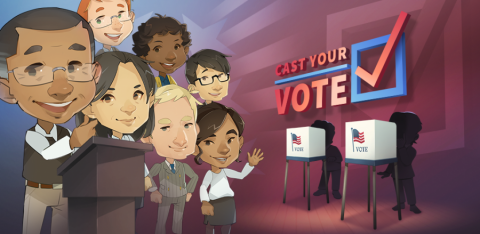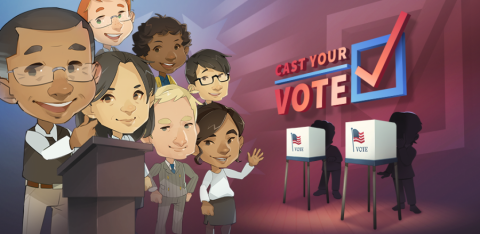
On September 13, iCivics will host a special event with All Vote No Play featuring athletic leaders who will discuss the motivation and choices behind their work and collective impact.
Participants will have the opportunity to listen and learn from great leaders like four time NBA Champion and “Team Democracy” superstar, Stephen Curry; former Secretary of State, Condoleezza Rice; the most winning NCAA coach of all time, Tara VanDerveer; and, NFL champion for social change, Demario Davis. These individuals will be interviewed by student athletes, giving attendees chance to understand and explore their individual and collective civic dispositions, skills, and leadership postures.
To make civics experiential, relevant, and meaningful to all learners and students, we invite your classrooms to participate and learn about creating and nourishing civic values, civic cultures, and civic communities. Consider assigning this event as homework to your civics, government, or social studies classes and inviting further reflection, inquiry, and conversation.
Some learning questions you might offer to your students, include:
- What does civic engagement mean to you? How does it show up in these leaders’ lives and intentional choices?
- How do you think about civic power and what’s required to create positive change? What kinds of power did you hear about in the conversations? How did these leaders use their personal platforms and power in community building and value-amplifying ways?
- As an athlete, and as a citizen, what is your responsibility to serve the communities around you? How do you do that in your life – in big or small ways?
- What are other instances in your community where athletic or cultural leaders are making a difference?
In addition to your class discussion, we have other readings and resources that explore the intersection between civic power and possibility available on our websites.
- iCivics games – Play one of our 15 games and use its extension pack to teach around the game with pre- and post-game activities.
- Untold Stories: Changemakers of the Civil Rights Era – Watch short, animated videos that examine the actions and accomplishments of civil rights activists of the 1950s and ‘60s
- Citizenship & Participation – Assign lessons from this curriculum unit focused on what it means to be a U.S. citizen, how citizenship is obtained, and the responsibilities of citizens.
- Constitution EXPLAINED – Watch this comprehensive video series that explains the text, history, and relevance of the U.S. Constitution, Bill of Rights, and additional amendments in everyday language.
- All Vote No Play: Learn civic drill– Listen to Baratunde Thursson’s How to Citizen Podcast
- All Vote No Play Engage civic drill – Watch: TED Talk “Why Ordinary People Need to Understand Power,” by Eric Liu, author of “You are More Powerful Than you Think”
- All Vote No Play Engage civic drill – Watch How to Tap Into Your Power as a Student Athlete, Citizen University
- All Vote No Play Engage civic drill – “I’m citizening by…”
- All Vote No Play Learn civic drill – Watch: More examples of athletes changing their civic futures, like HBO: The Assist, about how the WNBA shaped the future of the Georgia Senate runoff, or U.S. Women’s Soccer Team’s LFG documentary about fighting for equal pay.
We’re excited to hear how this experience goes for you and your class! Be sure to let us know by emailing us at [email protected], and tag us in any social media posts, @AllVoteNoPlay and @iCivics.



